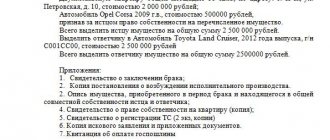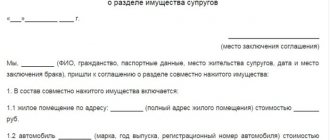Commentary on the article Judicial practice Comments 1. When dividing the common property of spouses and determining shares in this property, the shares of the spouses are recognized as equal, unless otherwise provided by the agreement between the spouses.
2. The court has the right to deviate from the beginning of equality of shares of spouses in their common property based on the interests of minor children and (or) based on the noteworthy interests of one of the spouses, in particular, in cases where the other spouse did not receive income for unjustified reasons or spent the common property of the spouses to the detriment of the interests of the family.
3. When dividing the common property of the spouses, the common debts of the spouses are distributed between the spouses in proportion to the shares awarded to them.
ConsultantPlus: note. The conditions and procedure for concluding marriage contracts established by Chapter 8 apply to marriage contracts concluded after March 1, 1996. Marriage agreements concluded before March 1, 1996 are valid to the extent that they do not contradict the provisions of the Code (clause 5 of Article 169 of this document). Chapter 8. CONTRACTUAL REGIME FOR SPOUSES’ PROPERTY
Commentary on Article 39 of the RF IC
1. When concluding a voluntary agreement on the division of jointly acquired property, the spouses themselves determine their shares, which will not necessarily be equal. Judicial practice imposes additional requirements on the content of such an agreement - it must define the shares of the spouses and clarify what property is to be transferred to each of the spouses. In this case, the rights of their minor children, as well as the relevant interests of the parties, must be taken into account.
If an appropriate agreement is not reached, the division of the common property is carried out by the court, which itself determines, at the request of the spouses, what property is to be transferred to each of the spouses.
If one of the spouses is transferred property, the value of which exceeds the share due to him, the other spouse may be awarded appropriate monetary or other compensation. The shares are determined in ideal shares (usually in arithmetic fractions), and then a subject-by-subject division of the property is carried out. When dividing property, the court takes into account the wishes of the spouses, professional interests, health status and other factors.
2. In paragraph 17 of the Resolution of the Plenum of the Armed Forces of the Russian Federation of November 5, 1998 No. 15 “On the application of legislation by courts when considering cases of divorce”, it was noted that the court, when dividing property that is the common joint property of spouses, may in some cases deviate from the beginning of equality of shares of spouses, taking into account the interests of minor children and (or) the noteworthy interests of one of the spouses. These include, in particular, cases where a spouse did not receive income without good reason or spent the common property of the spouses to the detriment of the interests of the family (for example, lost family funds in gambling, spent them on alcohol, drugs), as well as cases when one of the spouses, due to health reasons or other circumstances beyond his control, is deprived of the opportunity to receive income from work.
3. The property that is subject to division also includes the rights of claim and common debts of the spouses. Common debts mean the obligations of both spouses (for example, a loan agreement was signed by both spouses), and one of them, if the court determines that everything received by this spouse under this obligation was used for the needs of the family (for example, a loan agreement was signed by only one of the spouses , however, the funds received were intended for the purchase of shared housing).
The division of such property is carried out according to general rules. Thus, according to paragraph 3 of the commented article, the common debts of the spouses when dividing the common property of the spouses are distributed between the spouses in proportion to the shares awarded to them.
How to divide property during divorce
Popular options for such actions are re-registration in the name of relatives, concealment of valuables. For example, it is planned to buy a car with common money. The husband visits the notary and agrees with his mother that she will formalize a donation of money for him in order to purchase a car.
It is also possible to issue fictitious loans for the specified purpose by issuing receipts and agreements. What to do in the above case This property is subject to inclusion in the general list. But in each case there will be a challenge. The procedure is complex and lengthy.
It includes recognizing the previous transaction as not corresponding to reality and returning the property to its original condition. In such situations, the court treats all documents scrupulously and makes a verdict. For example, the boat is registered to a grandfather who cannot drive it. The dacha is registered to a relative living in another area. At the same time, there is no reason to increase or decrease the share in the joint property of the spouses, unless there are some exceptional circumstances (for example, a child who remains with one of the parents is disabled, requiring additional funds for care and treatment, or who needs to be allocated a separate room for accommodation). When considering cases on the division of the common property of spouses and the redistribution of shares in the interests of their common minor children, they proceed from the fact that things that, although not acquired to meet the needs of minors, should be added to the share of the property of one of the spouses with whom the child remains. children (clothes, shoes, school and sports supplies, musical instruments, children's library and others (Part 5 of Article 38 of the RF IC)), but due to their significance for the child they can be classified as such.
USEFUL INFORMATION: How many times a month can a father see a child after a divorce by law?
Another comment on Art. 39 of the Family Code of the Russian Federation
1. When dividing property that is the common joint property of spouses, the court, in accordance with paragraph 2 of Article 39 of the RF IC, may in some cases deviate from the beginning of equality of shares of the spouses, taking into account the interests of minor children and (or) the interests of one of the spouses that deserve attention. The interests of one of the spouses that deserve attention are understood not only as cases where a spouse, without good reason, did not receive income or spent the common property of the spouses to the detriment of the interests of the family, but also cases when one of the spouses, due to health reasons or other circumstances beyond his control, is deprived of the opportunity to receive income from work. The court is obliged to provide in its decision the reasons for the deviation from the beginning of equality of shares of the spouses in the common property.
2. The common debts of the spouses should be understood as debts that arose during their marriage in connection with running a common household, making transactions in the interests of the family, bearing responsibility for damage caused by their minor children to third parties, etc.
Debts
Article 39 specifies the proportional distribution of the debts of the spouses acquired during their life together. In order to thoroughly understand this issue, a codex with comments is best suited. In them you can become more familiar with the content of the article and understand the meaning of its brief content.
The commented code explains that joint property consists of:
- Certain items (the property itself);
- Rights of claim;
- General debts.
It is important that the court considers both common debts and the debt of one of the spouses if the funds were spent for the benefit of the family, exclusively for its needs.
Division of marital property in court
When dividing the common property of spouses, the owners are given the right to independently decide how they will do this: based on an agreement or through the court. In the first case, the property of the spouses is divided by them in any proportions at their own discretion.
If the parties decide to resort to the help of the court, they should be prepared that the court, in the matter of division of property, adheres to the principle of equality of shares of spouses. Deviation from it is provided for by law, but only in the presence of significant circumstances (Article 39 of the RF IC).
The Family Code determines that all property purchased during marriage is the common property of the spouses. They have equal rights to use and dispose of it. If a husband and wife divorce and wish to divide such property, naturally, the principle of equality of the spouses’ shares in the common property arises in relation to it. This happens automatically, simply based on the fact that the parties have equal rights and claims to it.
The division of the common property of spouses most often occurs in court. And if the spouses themselves, when drawing up an agreement, may not think about the equality of shares, but establish them at their own discretion, the judge, when making a decision, is deprived of this opportunity. He will strictly adhere to the standards set out in the RF IC, because obliged to divide the property equally.
How to distribute shares between spouses
How are the shares of spouses determined?
If common property is jointly owned by spouses, each of them has an equal right to it. As long as the parties live together, it can be easily implemented. But when it comes to dividing marital property, it will first require determining the size of the husband's share and the wife's share.
According to the RF IC, the shares must be equal. That is, if spouses bought an apartment during marriage, spending money on its purchase from the family budget, then when dividing the property, everyone should get a share of 50%.
In this case, a deviation from the beginning of equality of shares of spouses, although possible, is very rarely implemented in practice. All possible reasons are presented in Art. 39 RF IC.
True, shares in common property may initially be assumed to be unequal. This situation is possible if one of the spouses additionally invested their personal funds in the acquisition or improvement of property. For example, a couple bought an apartment worth 5 million rubles. Previously, the husband sold his personal dacha for 1 million rubles. The proceeds were invested in the purchase of real estate. When dividing property, the spouse's share was increased due to his personal funds invested in the apartment.
This situation also often arises if the court recognizes the personal property of one of the spouses as joint. This is possible on the basis of Art. 37 of the RF IC, when such property is significantly improved at the expense of the family budget, and as a result its value increases. For example, a spouse has his own apartment worth 3 million rubles. During the marriage, extensive repairs were made to it, as a result of which the cost of housing increased to 4 million 200 thousand rubles. The money for it was taken from the sale of a room that belonged to the owner’s wife. When dividing property, the judge decided to recognize the apartment as joint property. Leave it in the possession of the former owner and oblige him to provide his ex-wife with a compensation payment in the amount of 1 million 200 thousand rubles.
In what situations does the court deviate from the principle of equality of shares?
In what cases does the court deviate from the principle of equality of shares of spouses?
Legal standards determine that a departure from the beginning of equality of shares when dividing property is possible if:
- This is required by the interests of the couple's minor child.
- One of the spouses did not intentionally contribute any income to the family budget, avoiding work or providing earned funds for general needs.
- If one of the spouses spent funds from the family budget to the detriment of the interests of his family without coordinating these expenses with the other party.
The options for derogating from the equality of shares of spouses have not been worked out in detail by law. Not a single legal act explains what it means to “consider the interests of minor children.”
It is clear that the term implies property interests. But how to implement this in practice and what the evaluation criteria are is not explained anywhere. Therefore, when analyzing judicial practice, it becomes clear that judges start from their own criteria.
The possibility of deviating from the beginning of equality of shares of spouses is, rather, a right rather than an obligation of judges. At least, this conclusion suggests itself when analyzing the decisions they make.
However, for two reasons everything is somewhat simpler. As a rule, if a man is not officially employed for a long time and cannot provide evidence that he supported his family, his share in the property is reduced. It should be understood that we are not talking about losing a job and not being able to find a new one. If such a citizen presents a certificate from the Employment Center stating that he is constantly trying to get a job, then no one will reduce his share.
Plus, the issue of periods of unemployment will be considered separately. If we are talking about several months, the judge will not take them into account. Everything will be considered together. For example, if the spouses’ marriage lasted 15 years, the spouses purchased an apartment 6 years after the wedding, and the man has not worked for the last year, the judge will not reduce his share.
And if he and his wife took out a mortgage loan for 10 years, and in the last three years he quit his job and did not intentionally want to get a job, then his share in the mortgaged housing will be less than that of his wife. If a woman goes to court with a claim and proves that she paid off the debt on her own in recent periods.
Increasing the share when dividing property and having minor children
The court should take into account only the interests of the spouse and common minor children, but not third parties (for example, children from previous or subsequent marriages)
Now let’s look at the most common examples in practice of the interests of minor children that deserve attention, applied by the courts when changing the shares of spouses. The request to increase his share is usually made by the spouse with whom the common minor child remains living.
Attention
If a claim is made to increase the share in the residential premises, then it should be the only one for the plaintiff. Most often, the courts agree with the need to increase the plaintiff’s share if the child, due to his health (presence of illnesses, disabilities), needs to maintain a separate room for him to study and relax. For example, in one case considered by the Supreme Court of the Russian Federation (Determination dated July 14, 2015 No.








